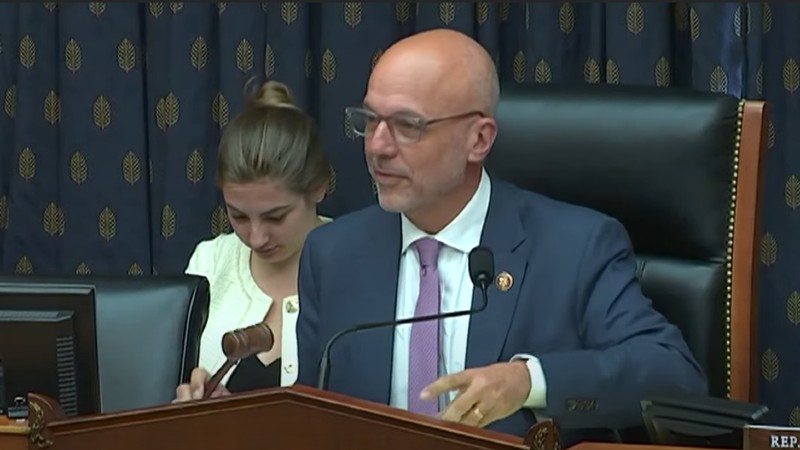Last week, a South Florida congressman urged the Trump administration to review its take on the Holocaust, including when it started, as it readies for a U.S. Supreme Court case on art owned by Jewish dealers which was seized by the Nazis.
U.S. Rep. Ted Deutch, D-Fla., joined U.S. Reps. Brendan Boyle, D-Penn., Gregory Meeks, D-NY, Grace Meng, D-NY, Max Rose, D-NY, and Greg Schneider, D-Ill., in a letter to U.S. Acting Solicitor General Jeffrey Wall calling on him to change the current position on Federal Republic of Germany v. Alan Philipp.
The Supreme Court is scheduled to hear oral arguments on the case in early December.
“The Federal Republic of Germany v Alan Philipp, et al seeks to determine whether art that was owned by Jewish art dealers but was possibly taken coercively by Nazi Germany is subject to the expropriation exception of the Foreign Sovereign Immunities Act. This exception allows those seeking redress in court against a foreign government the opportunity reclaim stolen property,” Deutch’s office noted. “The correspondence argues that the Acting Solicitor General’s brief fails to incorporate bipartisan congressional action and understanding of the Holocaust, including when the genocide began, and what counts as permissible under ‘expropriation.’”
“Congress has acted on multiple occasions to provide clarity on Holocaust restitution issues,” Deutch said last week. “History cannot be ignored or rewritten, and I hope the Acting Solicitor General will take into consideration longstanding congressional action and intent. We will continue to support efforts to ease the burden for the recovery of Holocaust-era property.”
“Nazi Germany committed horrendous crimes against its own Jewish citizens and European Jews through outright murder and organized thefts. While we often, and rightfully, focus on the murder of millions of Jews, Germany’s economic coercion robbed Jews of the ability to keep property that was rightfully theirs,” said Meng. “This wasn’t some accident; it was intentional when the Nazi’s curtailed the rights of Jewish citizens in 1933 and it laid the groundwork for their murderous campaign to kill and steal from the Jews. Congress has passed many laws—on a bipartisan basis—making it clear what options Jews have to right those wrongs; the Acting Solicitor General’s brief before this case stands with the German government which is in contradiction to past congressional action and intent. We urge him to amend the brief.”
“Historically, Congress has worked to bring justice to Holocaust survivors and their families,” said Boyle. “While progress has been made in reuniting many of these works of art with their rightful owners, there are currently thousands of missing pieces of art. We must continue to raise awareness about artwork that was stolen by the Nazi regime, and redouble our efforts to return these pieces to their rightful owners.”
“While we are not taking a position on this case, we write to emphasize the long-held, bipartisan congressional actions related to Holocaust-era artwork restitution, the timeline of the Holocaust, and the scope and nature of genocide,” the representatives wrote Wall. “We were concerned to read that the United States’ brief for this case supports a German position that suggests that the sale of the cultural artwork collection in question was not forced based on the year of the sale. Germany has also argued that this forced sale of art to the Nazis does not count as ‘expropriation,’ or as an instance in which a right of property is made illegitimate when the country in question has violated international human rights law, as was true of Germany during the Holocaust. Germany ignores the fact that, by 1933, Jews had been eliminated from German economic life and that by then Adolph Hitler and the Nazi Party had complete control of Germany. This argument is at odds with facts and with decades of congressional action. Support for this argument is antithetical to American policy and values.
“According to the U.S. Holocaust Memorial Museum, laws passed by the Nazi Party in 1933 curtailed the rights of Jewish citizens and excluded them from German life; these laws would become the foundation for the Nuremberg Race Laws of 1935. To reject the actions of the Nazi Party before 1935 is to ignore the economic and societal pressures that threatened Jewish families,” they continued. “In 2017, Congress passed the Justice for Uncompensated Survivors Today (JUST) Act. We applaud the Secretary of State’s July 2020 report mandated by this law, where he stated: ‘the Holocaust was also one of the largest organized thefts in human history. The Nazi regime’s confiscation, seizure, and wrongful transfer of the Jewish people’s property were designed not only to enrich the Nazi regime at the expense of European Jewry but also to permanently eliminate all aspects of Jewish cultural life.’ These conclusions have a direct bearing on the case at hand.
“In the 2017 Elie Wiesel Genocide and Atrocities Prevention Act, Congress clarified the scope and nature of genocide, when it included ‘subject[ing] the group to conditions of life that are intended to cause the physical destruction of the group in whole or in part.’ The United States’ brief instead echoes the German position noting that genocide is understood as involving infliction of physical killing and harm, but not economic crimes,” they added. “We request that your office consider amending your brief and look forward to your response.”
With Election Day next week, Republican Jim Pruden, an attorney, is running against Deutch in a heavily Democratic district.
Reach Kevin Derby at kevin.derby@floridadaily.com.











